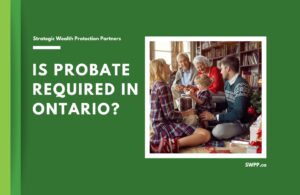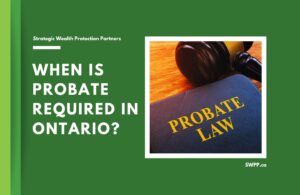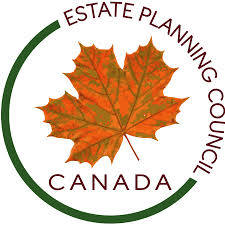Written by Ron Cooke, President & Founder of Strategic Wealth Protection Partners in Ontario, CEA®, Member of the Estate Planning Council Canada
How Probate Fees Work in Ontario
Probate fees in Ontario are based on the total value of an estate.
When someone passes away, their assets may need to go through probate, which is a court process confirming the validity of a will. In Ontario, probate fees—officially called the Estate Administration Tax—are calculated based on the total value of the deceased person’s assets.
As of 2024, the fee is 1.5% or $15 for every $1,000 of estate value over $50,000.
For example, if an estate is worth $500,000, the probate fee is $7,000. Planning ahead can help reduce these fees, ensuring more of the estate goes to beneficiaries rather than taxes.
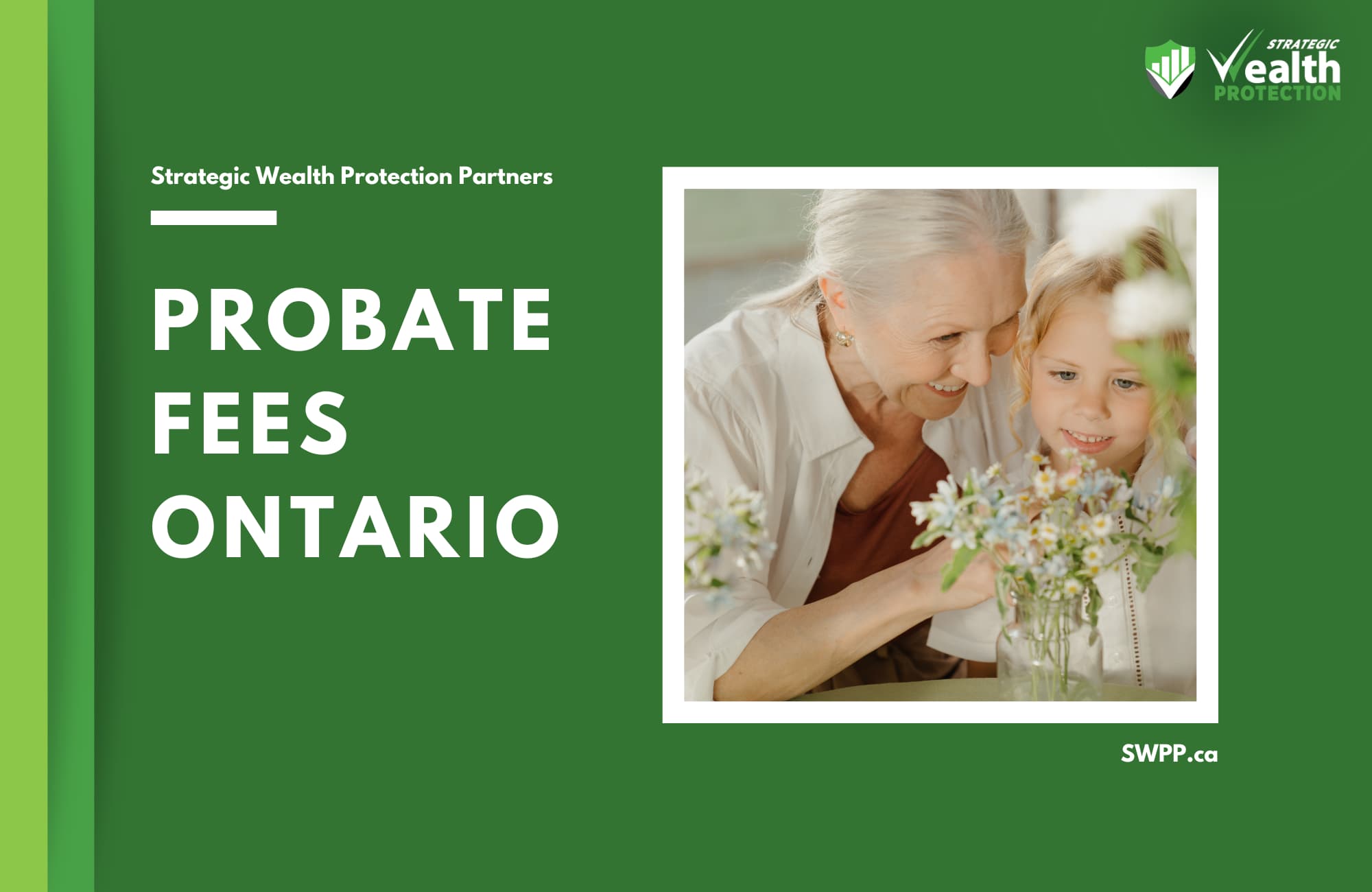
Key Takeaways
Probate fees in Ontario apply to assets passing through an estate, including Ontario real estate, bank accounts, and investments.
The fees are based on the fair market value of the estate, with strategies available to reduce probate fees, such as trusts, joint ownership and certain investment accounts which flow to beneficiaries avoiding probate.
A succeeding estate trustee may be appointed if the named executor cannot fulfill their duties.
Delays in probate can impact estate distribution, causing financial strain on beneficiaries. Professional advisors, including lawyers and Ontario estate planning experts, can help implement effective estate planning strategies. Planning in advance ensures a smooth transition of assets while minimizing unnecessary costs and legal hurdles.
Ontario Probate Fee Calculator
What Is Probate?
Probate is the legal process of confirming a will and appointing an executor.
In Ontario, probate ensures that a will is valid and gives the executor the legal authority to manage and distribute the deceased person’s estate. If there is a will, the named executor applies for a Certificate of Appointment of Estate Trustee.
Without this certificate, many financial institutions will not release assets.
Probate also protects against fraud, ensuring that the correct person is handling the estate. Some assets, such as jointly owned property or designated-beneficiary accounts, may bypass probate. However, most estates require this process to distribute assets legally and fairly.
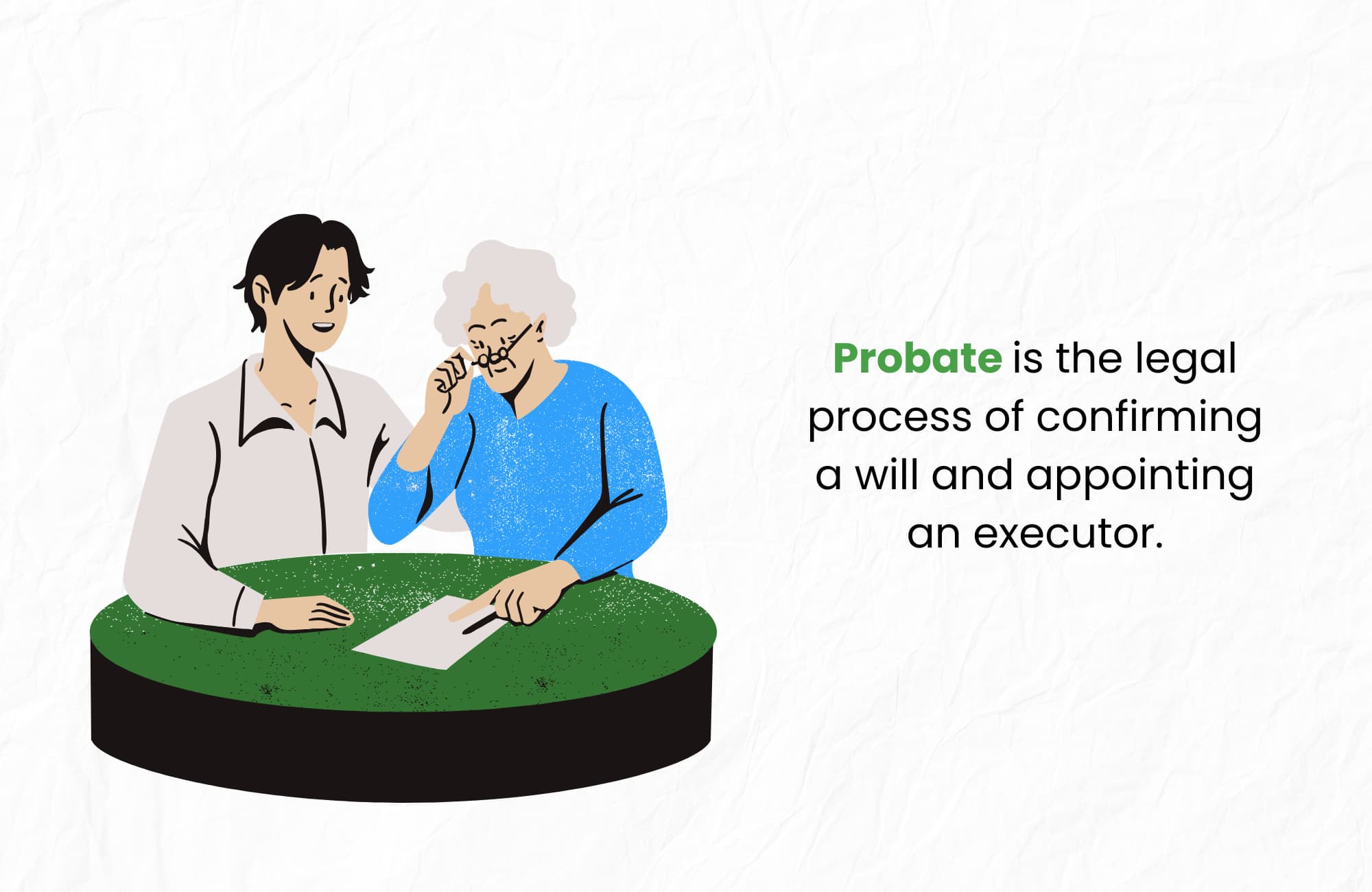
What Happens If You Have No Will in Ontario?
Dying without a will means Ontario’s intestacy laws determine asset distribution.
When someone dies without a will, they are considered to have died intestate. This means the Ontario court must appoint an estate trustee to handle the distribution of assets according to the provincial intestacy laws.
The law prioritizes spouses, children, and other close relatives in a specific order.
For example, if the deceased had a spouse but no children, the spouse inherits everything. If there are children, the spouse receives the first $350,000, with the remainder split between the spouse and children. Without a will, there is no control over who receives assets, leading to potential disputes and delays.

How to Calculate Probate Fees in Ontario
Probate fees are calculated based on the total value of the estate.
The formula for probate fees in Ontario is straightforward. There is no fee for the first $50,000 of the estate. For any amount over $50,000, the tax is $15 per $1,000. For example, if an estate is worth $200,000, the probate fee would be calculated as follows:
- The first $50,000 is exempt.
- The remaining $150,000 is taxed at $15 per $1,000.
- $150,000 ÷ 1,000 = 150
- 150 × $15 = $2,250
So, the total probate fee for a $200,000 estate would be $2,250. Larger estates will pay higher fees, making it important to explore strategies to minimize costs.
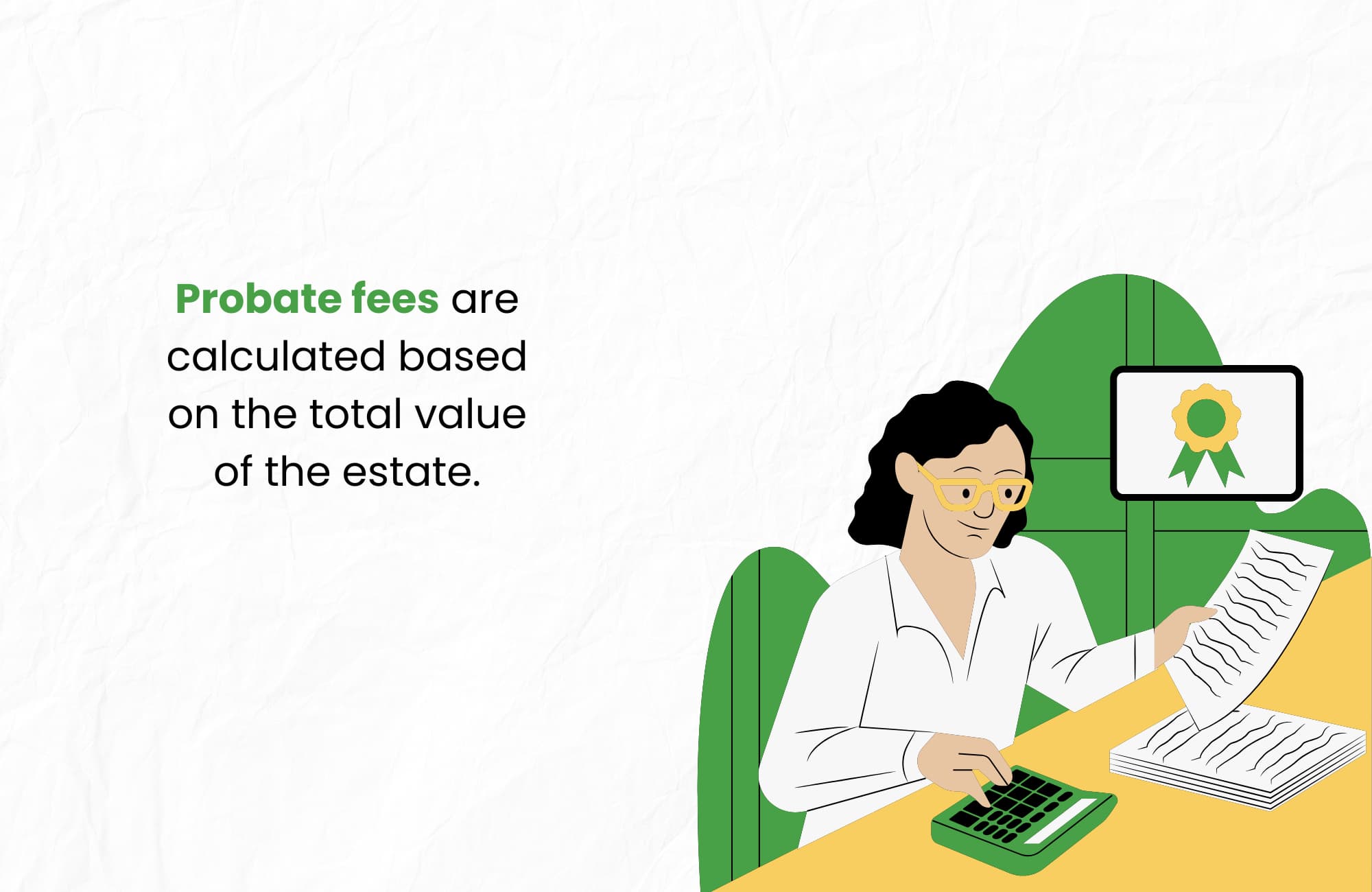
Who Pays Probate Fees in Ontario?
Probate fees are paid from the estate before assets are distributed.
The executor of the will is responsible for ensuring that probate fees are paid. These fees are taken from the estate’s funds before distributing assets to beneficiaries.
If there is not enough cash available, the executor may need to sell assets to cover the cost. Beneficiaries do not pay probate fees directly, but a high probate fee can reduce the inheritance they receive. Proper estate planning can help minimize the financial impact on the estate.
How to Pay Probate in Ontario
Probate fees must be paid when applying for probate.
The probate fee, or Estate Administration Tax, must be paid when the executor files for probate with the Ontario Superior Court of Justice. Payment is typically made by cheque, bank draft, or online banking, depending on the court’s requirements.
The fee is due at the time of application, and failure to pay can delay the probate process. Executors should ensure they have access to estate funds or personal funds to cover the cost upfront, as reimbursement can be processed once estate assets become available.
Check the Ontario government website for the most up-to-date information on how to pay probate.
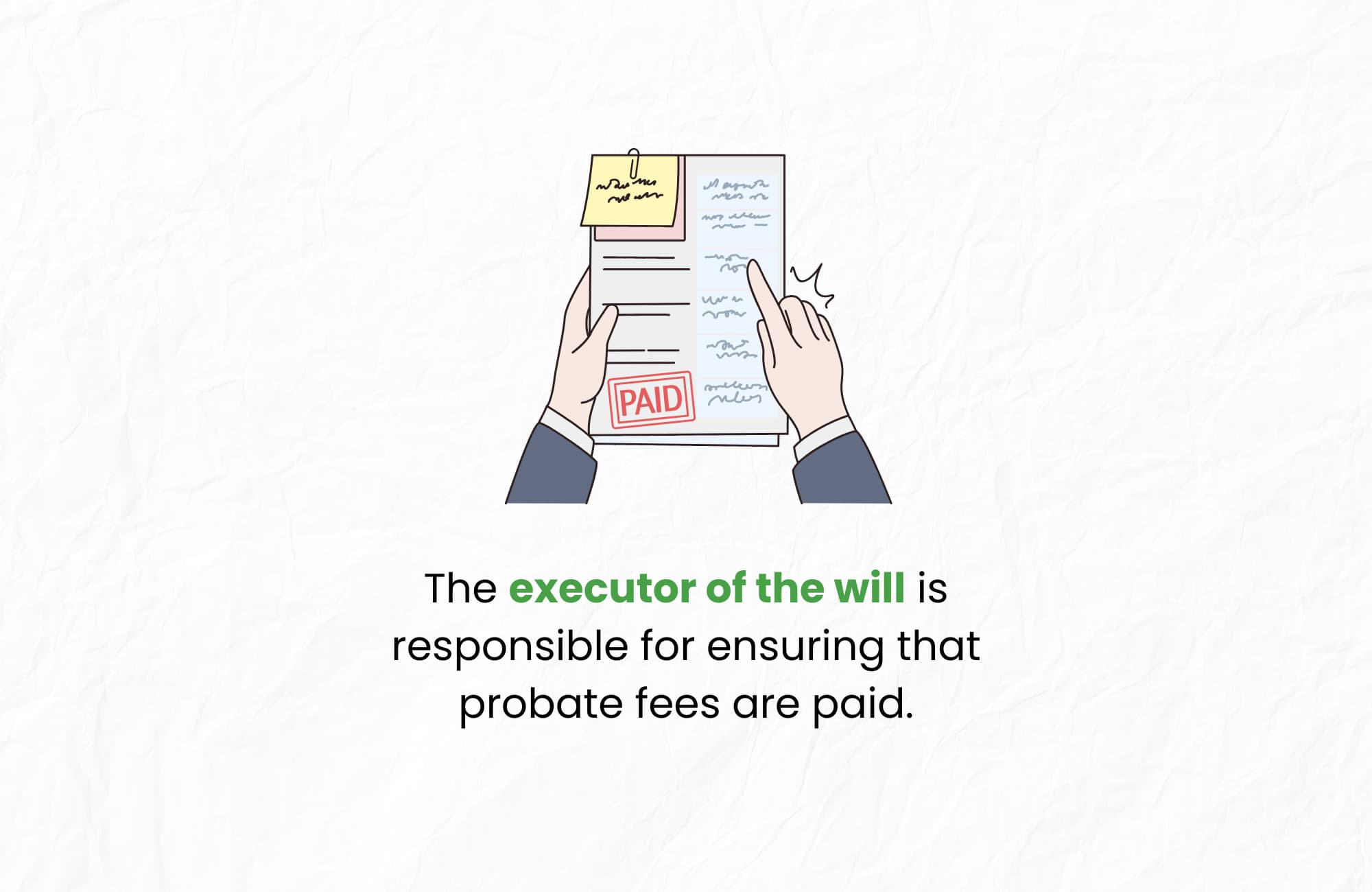
Refunds and Adjustments for Probate Fees
An estate may qualify for a refund if asset values were overestimated.
If an estate initially overpaid probate fees due to an incorrect valuation of assets, a refund can be requested. This typically occurs when real estate or investments are later assessed at a lower value than originally reported.
The executor must file an amended application with the court, along with supporting documents proving the revised asset values. If approved, the Ontario Ministry of Finance issues a refund for the overpaid amount. However, adjustments must be requested within four years of the original payment date.
Penalties and Appeals of Probate Fees
Failing to pay probate fees on time can lead to penalties and legal issues.
If an executor does not pay the required probate fees when applying for probate, the court may reject the application or delay processing. If fees are miscalculated or unpaid, interest charges may apply.
In cases where an estate disputes the assessed tax amount, the executor can file an appeal with the Ontario Superior Court. The court will review financial documents and determine if an adjustment is necessary.
Seeking professional legal or financial advice can help avoid unnecessary penalties.
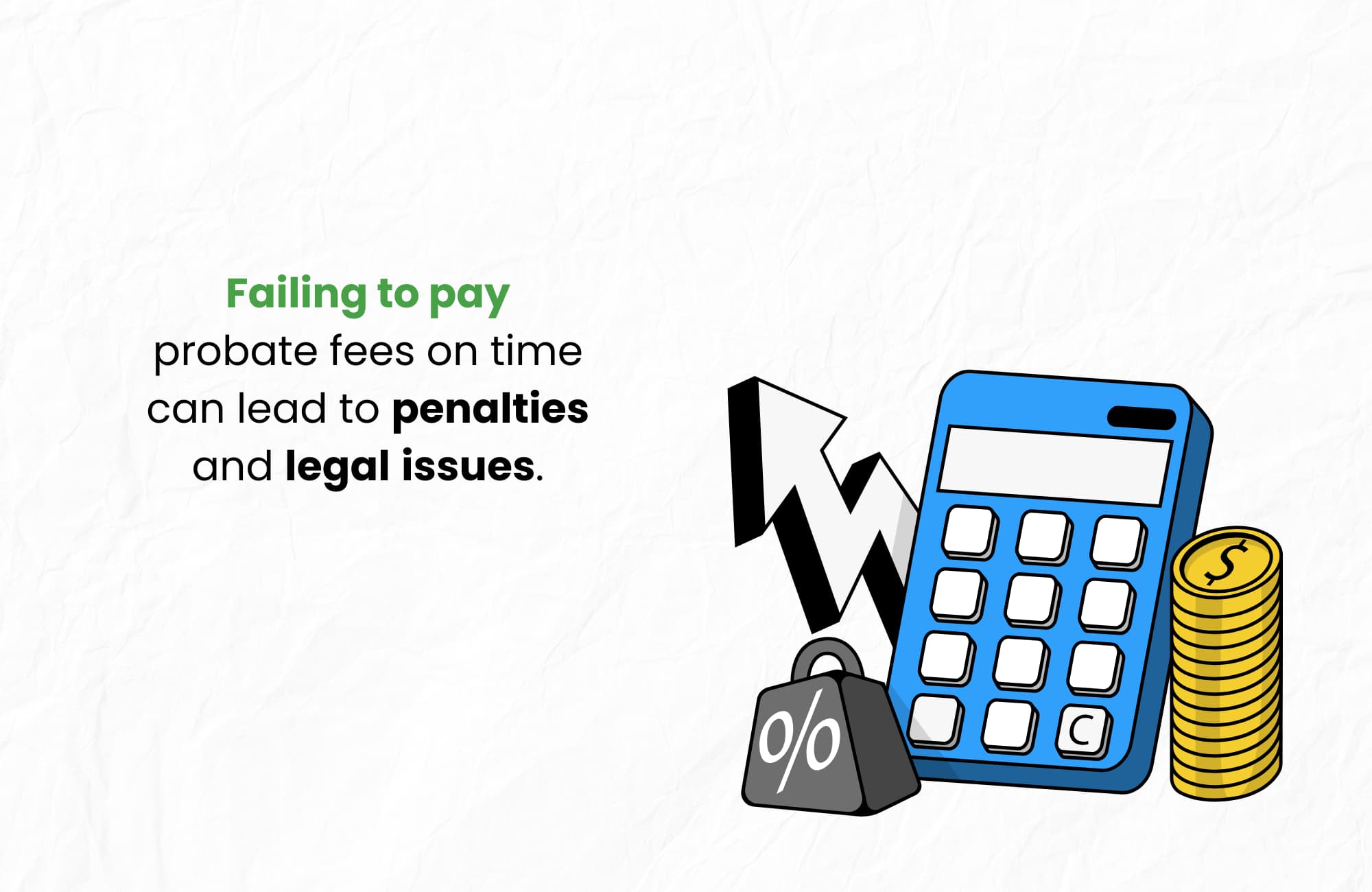
Which Assets Are Exempt from Probate Tax?
Some assets do not require probate, reducing the estate’s tax burden.
Certain assets in Ontario can bypass probate, meaning they are not included in the estate’s value for probate tax calculations. These include:
- Jointly owned property with right of survivorship – Automatically passes to the surviving owner.
- Registered accounts with named beneficiaries – RRSPs, RRIFs, TFSAs, life insurance proceeds go directly to beneficiaries and non-registered investments using a life insurance investment account.
- Assets in a living trust – Assets placed in a trust before death avoid probate.
- Certain pension benefits – Some workplace pensions transfer directly to beneficiaries without probate.
Read More: Which Assets are Exempt from Probate Fees in Ontario?
What Are the Costs of Probate Beyond Fees?
Probate involves additional expenses beyond government fees.
In addition to probate fees, estates may face legal fees, executor compensation, court costs, and administrative expenses. Lawyers charge fees for assisting with probate applications, which vary based on estate complexity.
For example, on a $500,000 estate, legal fees might range from $3,000 to $10,000, executor compensation could be around $25,000 (5% of the estate), and additional administrative costs might add $2,000 to $5,000.
These expenses can reduce the inheritance left for beneficiaries.
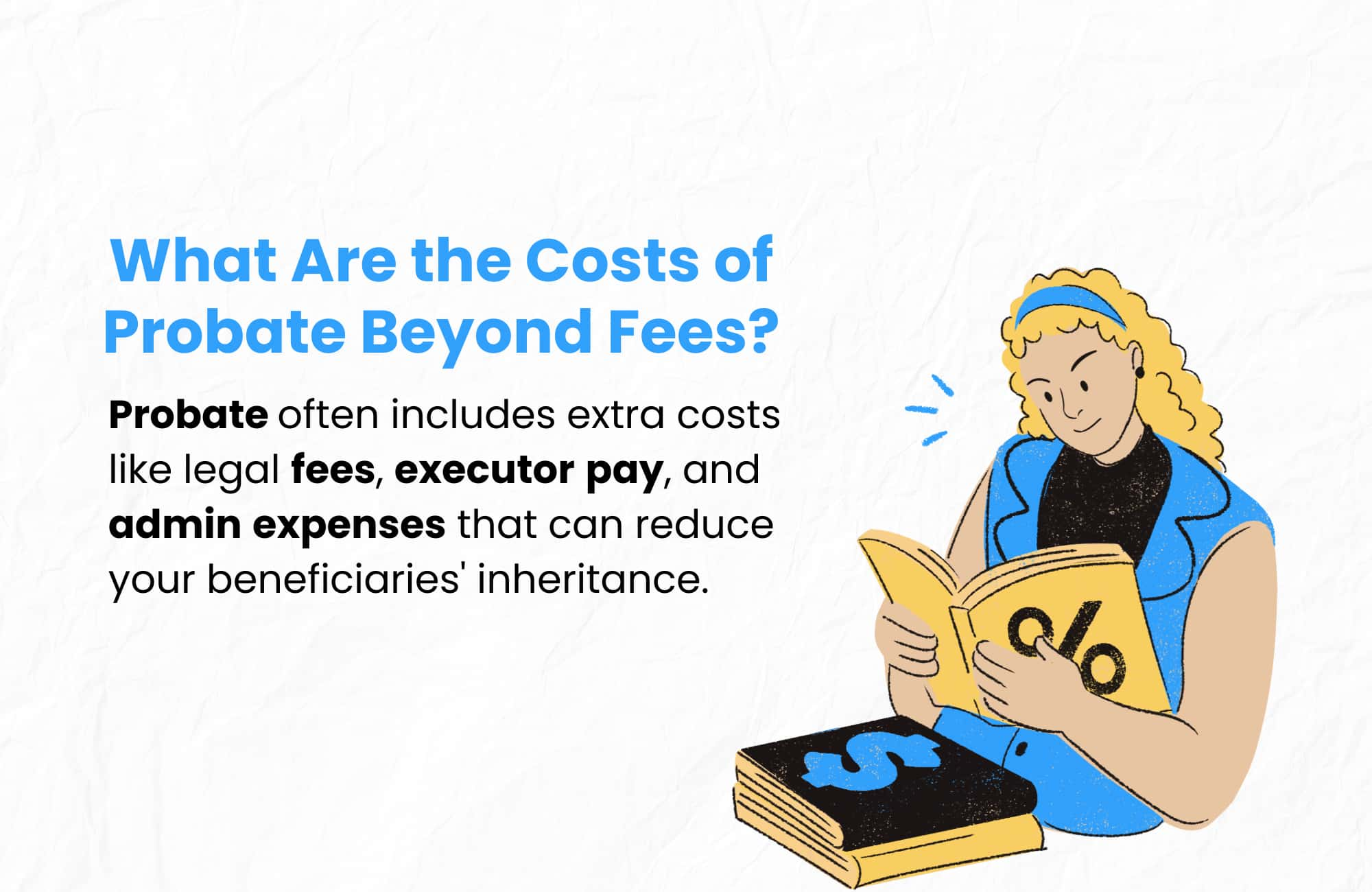
What Is the Role of an Executor in Probate?
Executors manage the estate and ensure assets are distributed correctly.
The executor is responsible for filing for probate, managing assets, paying debts, and distributing the estate to beneficiaries. They must also file tax returns, maintain records, and follow the deceased’s wishes as stated in the will. Being an executor can be time-consuming and complex, so seeking professional guidance may be necessary.
An executor is responsible for the following:
- Filing for probate
- Managing assets
- Paying probate fees
- Paying debts
- Distributing the estate to beneficiaries
Estate Administration Tax Basics Everyone Should Understand
The Estate Administration Tax is applied to most estates in Ontario.
Ontario’s Estate Administration Tax is calculated based on the value of assets that must go through probate. It applies to bank accounts, real estate, and investments unless they are exempt.
The tax is required to process an estate legally and must be paid before assets can be distributed. Understanding this tax helps with estate planning and minimizing probate costs.
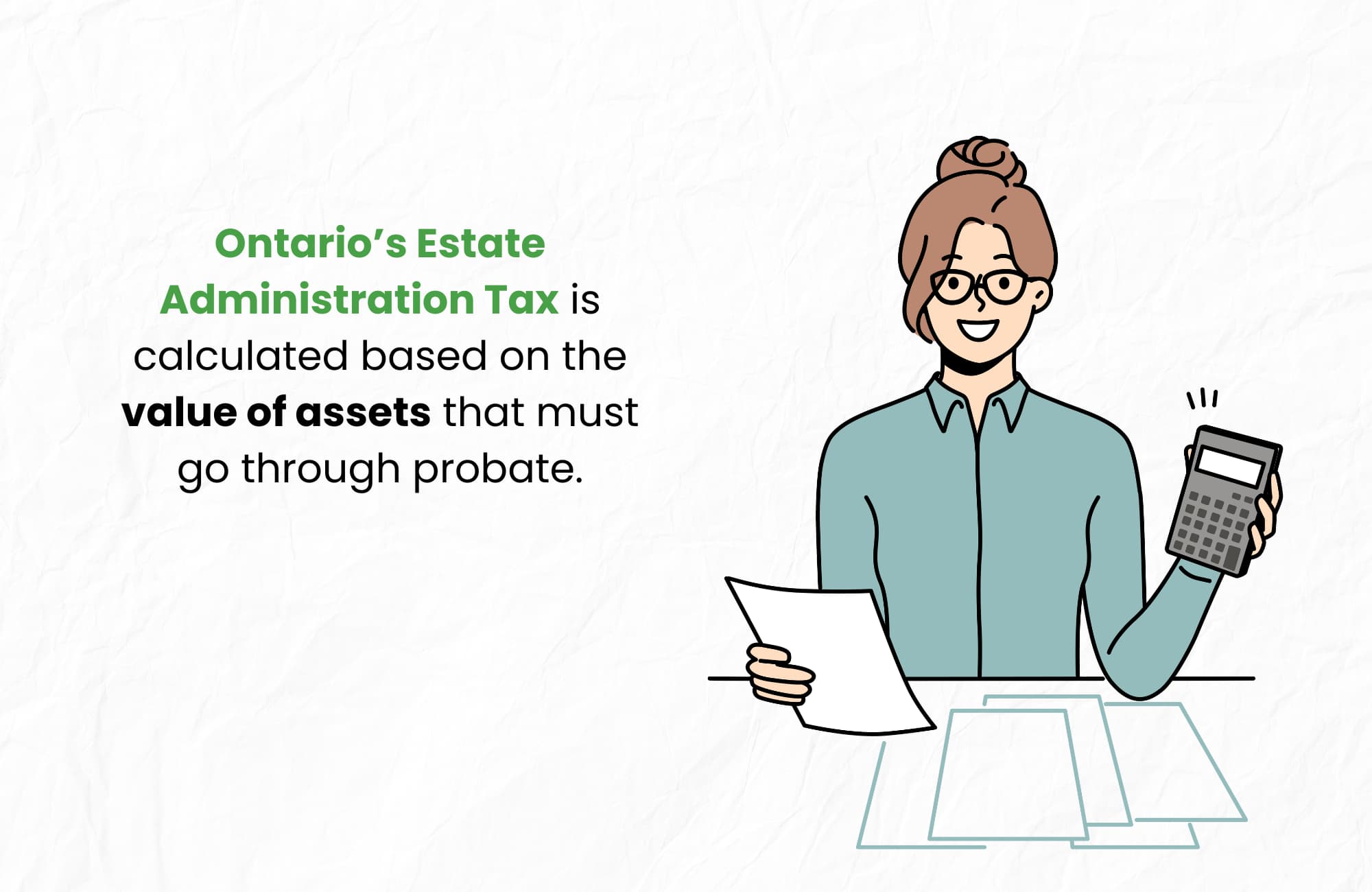
Common Questions about Probate & Estate Planning in Ontario
What assets are subject to probate fees in Ontario?
All assets solely owned by the deceased, such as real estate, bank accounts, investments, and personal property, are subject to probate fees unless they have a designated beneficiary or joint ownership with right of survivorship.
What happens if an executor refuses to apply for probate?
If an executor refuses to apply for probate, a beneficiary or creditor can petition the court to appoint another person as the estate trustee. The court may remove the executor and assign someone else to ensure the estate is properly administered.
Can an estate be distributed before probate is granted?
In most cases, no. Probate is required before distributing assets, as financial institutions and the land registry typically need legal confirmation of the executor’s authority. Distributing assets before probate can create legal and financial risks for the executor and beneficiaries.
How much does it cost to hire a probate lawyer in Ontario?
The cost of hiring a probate lawyer varies depending on the complexity of the estate. Fees typically range from $3,000 to $10,000 but may be higher for larger or contested estates. Some lawyers charge a percentage of the estate, while others work on a flat-fee or hourly basis.
What happens if probate fees are not paid?
If probate fees are not paid, the court may reject the probate application, delaying the estate settlement. Interest may accrue on unpaid fees, and the estate cannot be distributed until the fees are paid in full. Executors are responsible for ensuring these fees are settled promptly.
Do beneficiaries have to pay taxes on inherited assets in Canada?
In Canada, beneficiaries do not pay tax on inherited assets. However, the estate may have to pay tax on capital gains, RRSPs, or RRIFs before distribution. If taxes are owed, they are paid from the estate before beneficiaries receive their inheritance.
Final Thoughts
For high-net-worth individuals and families, effective estate planning is essential to preserving wealth and minimizing estate probate fees.
Leveraging trusts, beneficiary designations, and careful asset structuring can significantly reduce probate fees. These tools can also ensure assets are distributed according to your wishes.
Consulting an estate planning professional can provide tailored strategies to protect and transfer wealth efficiently.
Discover How to Minimize Taxes and Secure Your Legacy
Did you know that without a solid estate plan, taxes and fees in Ontario could claim a significant portion of your wealth?
If you’ve worked hard to build your business, investments, and properties, protecting your legacy for your loved ones is critical. At Strategic Wealth Protection Partners, we specialize in helping high-net-worth individuals in Ontario secure their financial futures.
Our Living Estate Plan is designed to:
- Reduce estate taxes and probate fees.
- Simplify wealth transfer to your loved ones.
- Reflect your values and priorities in every detail.
Your Legacy Matters
With our personalized guidance, we’ll help you navigate options like Living Trusts to protect your assets and ensure your family’s peace of mind. Contact us today to book your Living Estate Plan Consultation and take the first step toward a secure future.
Schedule a Living Estate Plan Consultation
Planning your legacy is about more than numbers—it’s about ensuring your family remembers you and your values are honoured for many years to come.
Estate planning and trusts can feel overwhelming, especially if it’s your first time. That’s why we’re here.
With our simple, 5-Step Living Estate Plan, we make the process easy, helping you create a comprehensive estate plan or trust that protects your assets from taxes and probate fees while preserving your legacy. Tools like The Final Word Journal capture your story, wishes, and essential details like accounts and end-of-life plans, ensuring your family has clarity and comfort.
Take the first step today—schedule a consultation call and give your family the ultimate gift: peace of mind and the assurance they were always your priority.
Read More
If you’re starting your estate planning process, you may find these articles helpful:
- What Is the Best Trust to Avoid Probate in Canada?
- Who Pays Probate Fees in Ontario?
- How Much Is Probate Tax in Ontario?
About the Author
RON COOKE, PRESIDENT & FOUNDER OF STRATEGIC WEALTH PROTECTION PARTNERS

With over 30 years in financial services, I’ve seen the challenges families face when a loved one passes—lost assets, unnecessary taxes, and emotional stress. That’s why I created the Living Estate Plan, a comprehensive process to protect assets, eliminate estate and probate fees, and create legacies that are remembered for many years to come.
This plan ensures your family receives not just your wealth, but a meaningful reminder of your care and love. Tools like The Final Word Journal capture your story, wishes, and essential details, offering clarity and comfort during difficult times.
Your final gift should be more than money—it should be peace of mind, cherished memories, and an organized estate.
Schedule a Call
Schedule a 30-minute consultation call with Strategic Wealth Protection Partners.
Click HERE to schedule a consultation.


